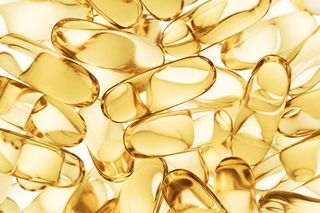
Untrending: Are Omega‑3 Supplements Good for You? Yes, Actually.
Better heart health is the most-established benefit of omega-3 supplements — but the nutrient holds plenty of promise in other areas.

In Untrending, we side-eye the latest fads so we know what we’re getting ourselves into — and what (if anything) we’re getting out of them.
Few dietary supplements have had as much attention from researchers as omega-3s. The onslaught of disconnected research has facilitated the proliferation of claims by manufacturers of the fatty acid’s near-miraculous health benefits, which include anti-aging and anti-cancer properties. This messaging, in turn, has convinced most of the public of omega-3s’ vitalness to general good health. But is omega-3 supplementation actually as good for you as everyone seems to think?
Omega-3s are fatty acids that, in certain versions, are critical building blocks of the brain, eyes and many other body parts.
Color me surprised but: yes, it’s true. While omega-3 supplements don’t carry all of the miracle benefits Pop Wellness imbues them with, after tens of thousands of studies, omega-3 supplementation has been established as having clear benefits in one realm, a lot of promise in some others — and still more completely unconfirmed effects in still others.
Proven benefits of omega-3 supplementation
- They reduce the risk of most cardiovascular problems, including heart attack, even in the general population who are not considered high-risk. (Supplements show no effect on stroke risk, however.)
Promising but not completely proven benefits of omega-3 supplementation
- They bolster neurodevelopment in fetuses (when taken by the mother during pregnancy) and infants (when taken by the baby).
- Omega-3s ease inflammation and symptoms of some autoimmune disorders.
- They reduce liver fat in patients with nonalcoholic fatty liver disease
- Omega-3 supplements assist in the management of symptoms of attention deficit hyperactive disorder (ADHD) in children and adolescents.
- They improve symptoms of mood disorders such as clinical depression and anxiety disorder.
- They ease dry eye and other eye-related problems.
Not enough evidence or conflicting evidence
- any effect on blood sugar levels in people with type 2 diabetes
- any effect on cancer, either prevention or treatment
- any effect on autism symptoms
- any effect on cognition in elderly people
- among other conditions
Related on The Swaddle:
Eating Fish While Pregnant: What We Do and Don’t Know
But you may not want to start popping omega-3 supplements, willy-nilly. First, most experts recommend adding fatty fish (mackerel, salmon, herring, oysters, sardines, anchovies) — the source of the fish oil in most omega-3 supplements — to one’s diet before resorting to supplementation. “A lipid [like omega-3] taken out of context out of other lipids, and just sort of, just a shot of lipid right there in the morning, when people are most likely to probably take their supplement, seems to me may be out of sync with what the body is able to deal with,” said Paul Greenberg, author of The Omega Principle, during a recent episode of The Atlantic’s Gastropodcast.
Second, it’s becoming increasingly clear that the type and dose of supplementation likely matter in determining health effects. But dosage, for most of the promising list at least, has yet to be established. Also, omega-3s come in three different types: alpha-linolenic acid (ALA), which is found primarily in flax seeds, flaxseed oil, canola oil, chia seeds, walnuts and soybeans; and eicosapentaenoic acid (EPA) and docosahexaenoic acid (DHA), which are primarily found in the oil of fatty fish like herring, sardines, salmon, mackerel, anchovies, and sablefish. EPA is also found in some microalgae, and DHA is also found in smaller amounts in meat, eggs, and dairy. While omega-3s’ effects on heart health are mostly linked to DHA, EPA, for example, is the type most studied and linked to mood benefits.
Third, it’s important to be sure of the quality of the supplement you’re taking — but that becomes difficult to judge as a layperson since supplements typically fall in a regulatory gray area; not food and not drug, the product faces less oversight in production. This lets many companies make supplements from fish oil — which breaks down quickly when exposed to oxygen — that has essentially spoiled, meaning the oil isn’t good for you anymore (even if it’s not actively bad), Greenberg said.
And finally, some experts are starting to suggest the amount of omega-3s in our diets — of any kind, any dose and any source — matter less than the ratio of omega-3s to omega-6s. Omega-6s are a different type of fatty acid found in vegetable oils, nuts and seeds that the body converts into arachidonic acid, which is a building block for some molecules that lead to inflammation, blood clotting, and the constriction of blood vessels — but also, confusingly, to molecules that ease inflammation and lessen clotting. This ratio needs much more research to establish its importance, but regardless, experts advise the solution is not to diminish one’s intake of omega-3s, but rather bolster it to meet our consumption of omega-6s.
So, ultimately, should you eat more fatty fish and/or take omega-3 supplements? Probably, if you’re above age 65, or if you’re at risk for or have already had cardiovascular problems. And pregnant women are also often advised to take omega-3 fish oil supplements, mostly in a ‘better safe than sorry’ sense, as doctors wait for future, more rigorous studies to conclusively prove the benefits that existing research hints at. Other than that? Well, omega-3 fish oil supplements are unlikely to hurt you, and may very well be proven, with more research, to hold benefits for a variety of ailments. But like any supplement, it’s best not to start them until you’ve consulted a doctor.
Liesl Goecker is The Swaddle's managing editor.
Related


A Day’s Exposure to Toxic Air Can Worsen Children’s Psychiatric Disorders
